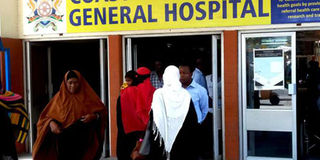Data critical in pursuit of UHC dream

Kenyans seek services at the Coast General Hospital in Mombasa. Medical services should be safe, effective and of high quality to improve health. PHOTO | FILE | NATION MEDIA GROUP
What you need to know:
- Decision makers must be empowered with the proper evidence to make cost-effective choices in resource allocation and use.
- Health system stewards need quality data and information to track and assess their progress towards set goals and objectives.
Universal health coverage (UHC), one pillar of the 'Big Four Agenda', is an important initiative that, if well implemented, would have a positive and transformative impact on the country’s health status and overall socioeconomic wellbeing.
It is about all people within a given jurisdiction having access to the healthcare services that they need without suffering financial hardship.
But the services should be safe, effective and of high quality to improve health and efficiently distributed to ensure the sustainability of resource allocation and use within the system.
Decision makers must hence be empowered with the proper evidence to make cost-effective choices in resource allocation and use, so that they are responsive to the prevailing health needs as well as take steps to eliminate health inequalities and promote fairness.
FUNCTIONS
But conversations around UHC have mainly focused on the rollout of medical insurance through the National Hospital Insurance Fund (NHIF) and other aspects of piecemeal health service delivery.
These include leasing equipment to hospitals and attempts at plugging human resource gaps with foreign workers.
And inasmuch as it might lead to immediate improvements and achievement of temporary objectives, this approach is devoid of the systematic and comprehensive outlook required to attain UHC.
The World Health Organisation (WHO) has clearly elaborated the six core functions of a competent health system.
They are ensuring adequate health financing, development and deployment of human resources for health, effective service delivery, promoting access to essential medicines and other health technologies, collection, analysis and utilisation of critical health information, and effective leadership and governance.
For UHC to become a reality, all the six components must function effectively and in tandem.
EFFECTIVE
According to the WHO framework, an effective healthcare system should increase access to safe, quality and effective interventions that improve health.
It must also be responsive to the non-health expectations of those seeking services, such as dignity and respect.
Financial contributions to the health system should not be based on the ability to pay, and therefore the poor should not be further impoverished in their quest for quality healthcare.
Finally, service provision should be done efficiently and cost-effectively while adhering to the democratic principles of equity.
Health data therefore become critical lenses for monitoring and evaluating the performance of all the parts of the health system in the efforts towards UHC.
QUALITY DATA
Based on experience from countries that have advanced towards UHC, it is a well-known fact that health system stewards need quality data and information to track and assess their progress towards set goals and objectives.
This entails a careful and judicious collection and collation of health data to logically link health system inputs to population level outcomes.
The link between inputs and outcomes is achieved through the activities and outputs in the effort to improve health.
To illustrate, within a childhood immunisation programme, financial, material and human resources are used to perform immunisation-related activities, the children vaccinated would be the output of those activities and the resultant population health improvements due to immunisation would be the outcome, or impact, of the programme.
To enhance its utility in policymaking and implementation, this measurement approach should be comprehensive rather than piecemeal.
COMPREHENSIVE
It should combine data from multiple sources within the healthcare system into a joint assessment framework, such that a consistent and informative narrative emerges.
Besides, efforts must be made to collectively assess the various health programme areas to include different diseases and injuries, as well as their respective risk factors, instead of narrowly focusing on vertical ones and ignoring others that might be equally important.
A book by my colleagues and I, Revisiting Health System Performance Assessment in Africa, illustrates that.
Therefore, the ongoing discourse towards UHC should not only be viewed narrowly through the lenses of health financing reforms alone but comprehensively, touching on the other five components of the healthcare system and its expected outcomes, and seek to remedy existing weaknesses.
Dr Achoki (PhD), a medical doctor and previously Sloan Fellow at MIT, is co-founder and chief business officer of Boston, USA-based Mass Sciences. [email protected]





